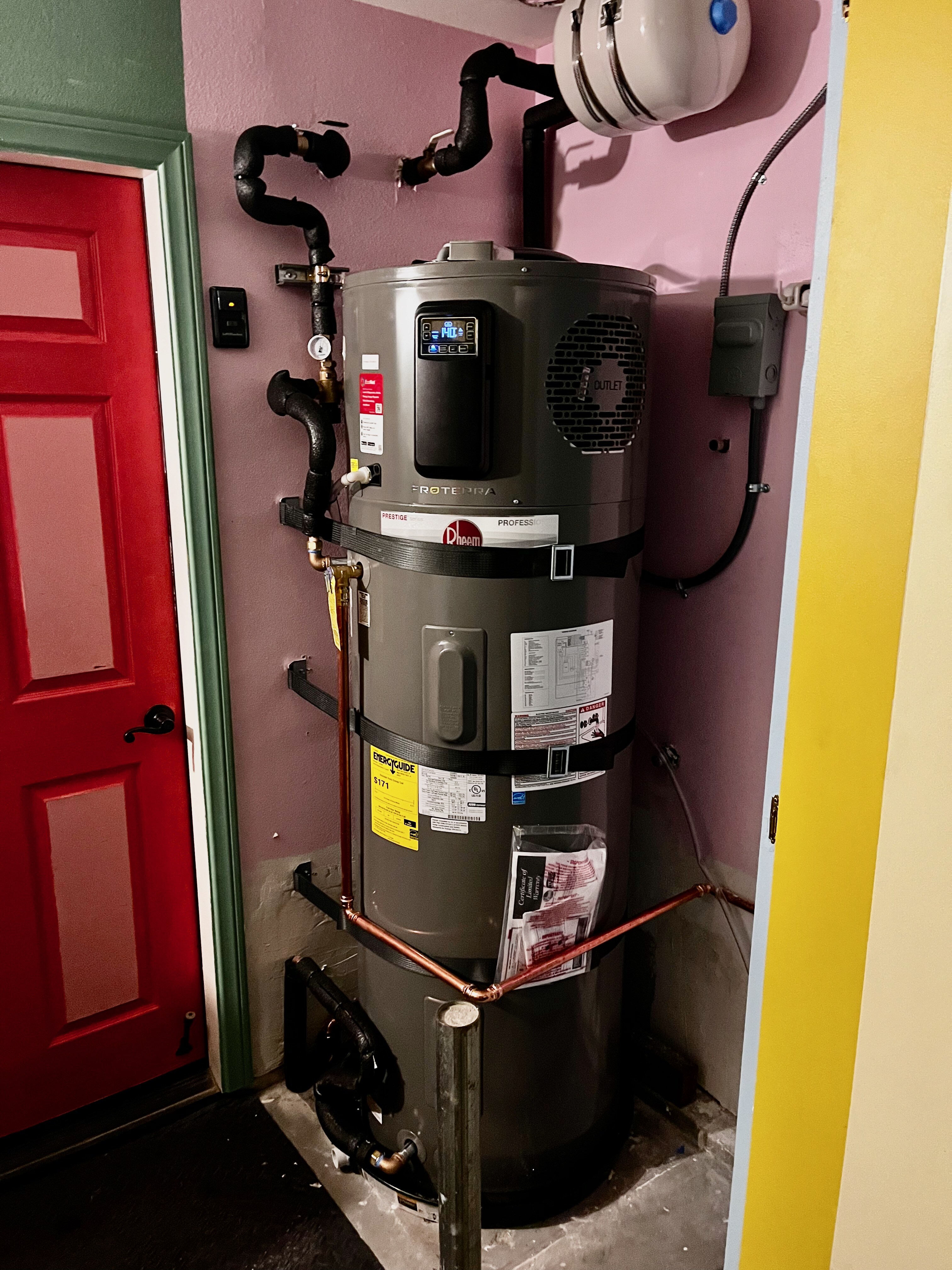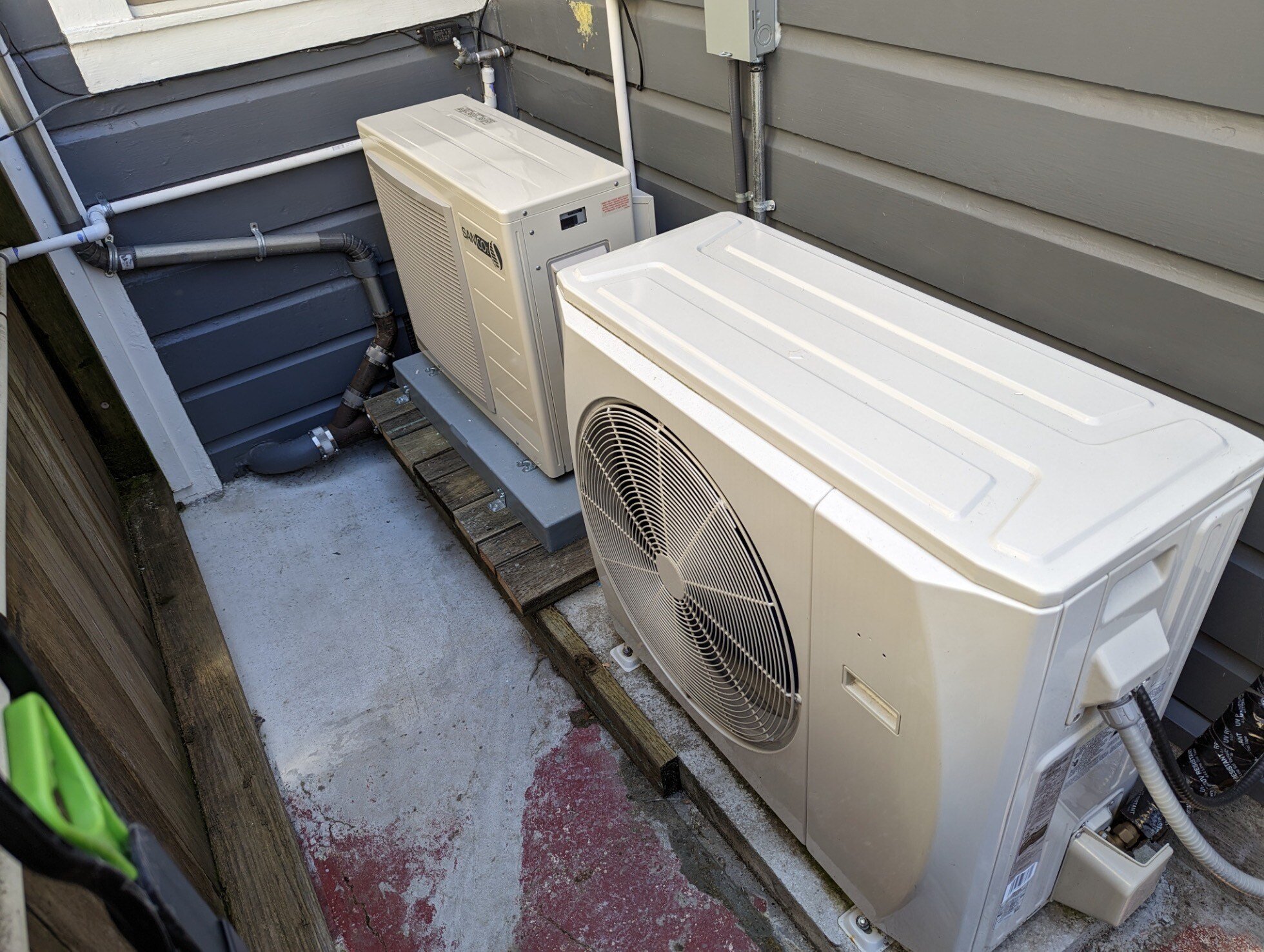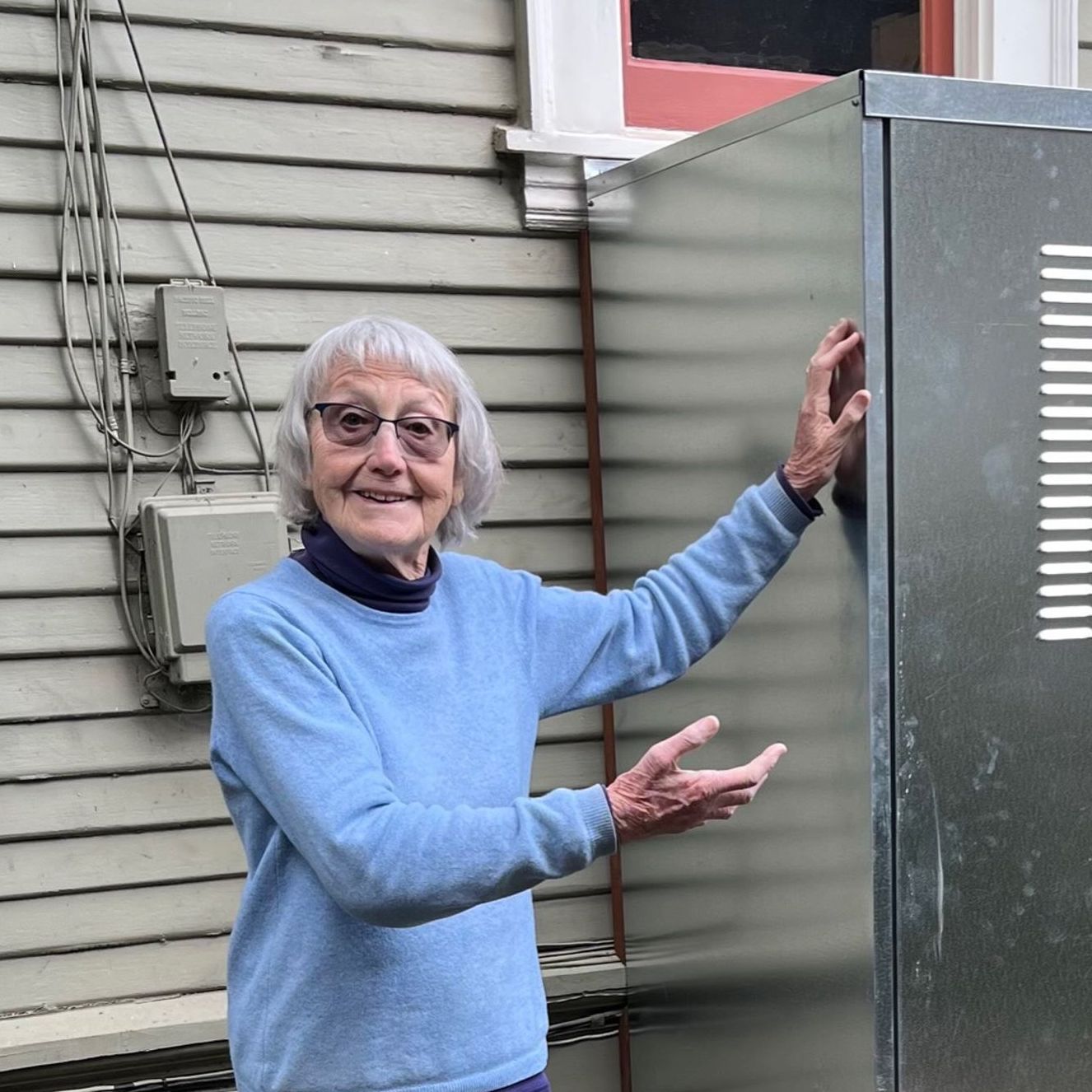From Ambition to Action: The 60-Day Home Electrification Campaign
Collaboration between QuitCarbon and 3C-REN Uncovers Practical Takeaways for Home Electrification Marketing.
Summary
In the race to mitigate climate change, organizations across the US are doubling down on sustainability initiatives. The tricky part is turning these commitments into tangible action. Too frequently, these high ambitions aren’t supported by solid metrics or data-driven tactics.
Like many organizations out there, Tri-County Regional Energy Network (3C-REN) has big ambitions around its Home Energy Savings programs. (See: What is home electrification?) They continuously work to inspire local homeowners to ditch gas and go electric. But they needed to gauge the effectiveness of their outreach methods and identify how to better invest their resources. That's where QuitCarbon came in – and demonstrated that it’s possible to move both swiftly and strategically.
In just 60 days, and with a modest budget, the QuitCarbon team accomplished what many organizations struggle with for years: devising and implementing a highly effective, insight-driven campaign to promote home electrification.
We shared many of the campaign's insights in a webinar presentation to PG&E; you can access the presentation slides and recording for free.
The Challenge: Inspiring Homeowners to Electrify
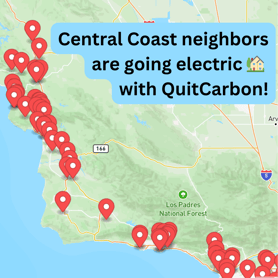
3C-REN, a public agency partnership between San Luis Obispo, Santa Barbara, and Ventura counties, helps residential customers reduce energy use. But with over 600,000 housing units in its service area, promoting home electrification on a massive scale is no simple task.
Homeowners face hurdles like upfront costs, lack of awareness about the benefits of electrification, and difficulty navigating rebates and finding electrification-friendly contractors. An effective marketing strategy is key to capturing attention and sparking action.
The Game Plan: Goals and Execution
The objectives were clear:
- Develop and test a broad spectrum of marketing content across digital and offline channels.
- Collect detailed data to identify the most effective content, messaging, and channels.
QuitCarbon wasted no time in tackling this challenge head-on. The team executed a comprehensive campaign from December 2023 to January 2024. (The holiday timing was far from ideal, but unavoidable due to 3C-REN’s fiscal year cycle.) QuitCarbon made the most of a limited budget, conducting extensive exploration across a wide variety of channels and messaging strategies.
At the heart of the campaign lay four distinct messaging pillars. Each pillar was designed to appeal to, and test the response from, different motivations and priorities:
- Appliance replacement/upgrade: Encouraging homeowners to replace their aging gas appliances with electric upgrades.
- Rebates and money savings: Highlighting the financial incentives and utility bill savings associated with electrification.
- Home safety and comfort: Positioning electric appliances as safer, cleaner, and healthier alternatives to legacy gas-powered appliances.
- Climate benefits: Emphasizing the role of home electrification in combating climate change and promoting a sustainable future.
Within each pillar, the QuitCarbon team tested dozens of messaging variations. They created four dedicated landing pages, 10 new videos, and over 50 images to explore different messages and tactics. They tested an array of outreach methods including Meta (Facebook and Instagram), Google, Nextdoor, Spotify, public radio, and direct mail postcards.
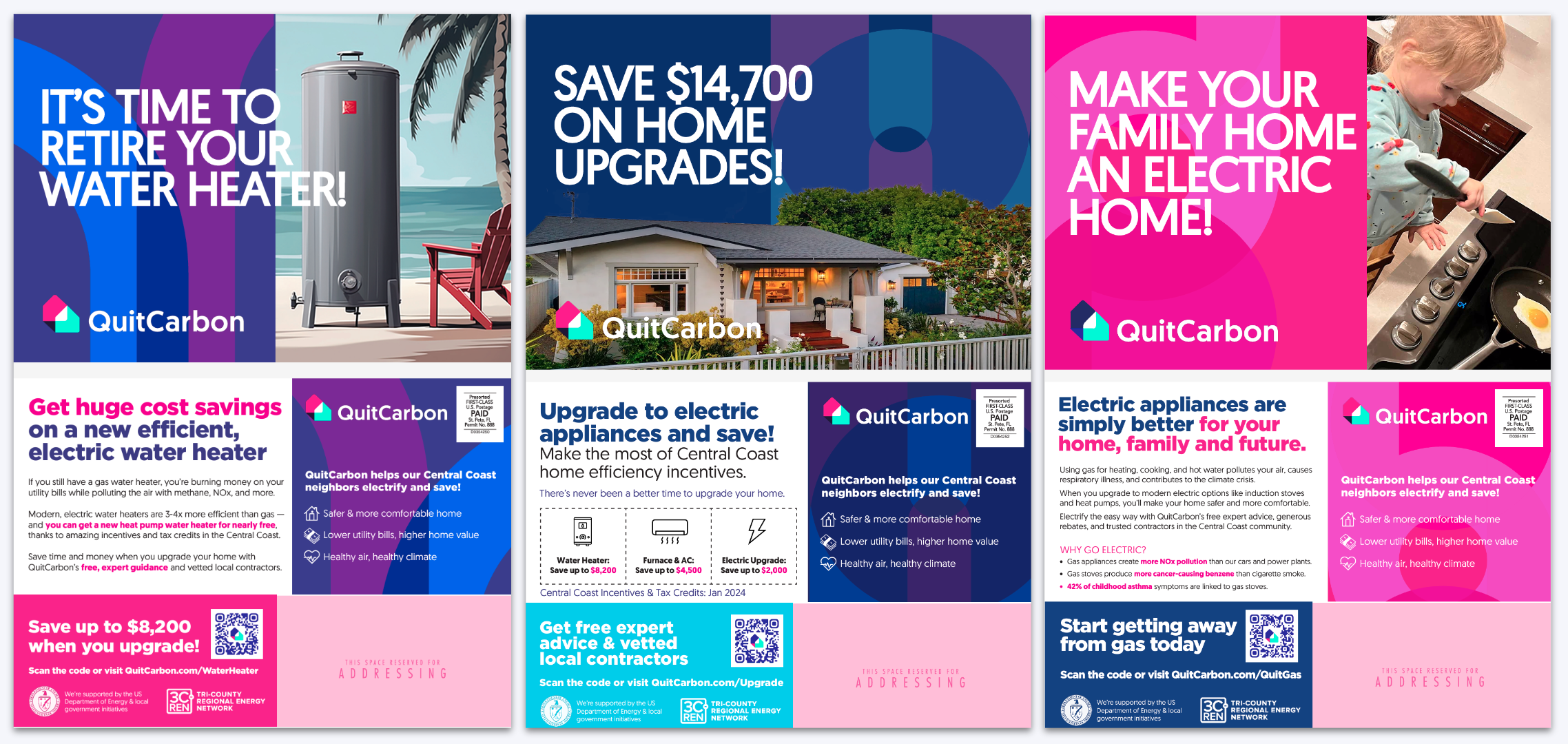
The Results
Despite the timeline crunch and lean budget, the campaign yielded impressive results. Within two months, QuitCarbon’s efforts generated 740,000 impressions of electrification messaging within the 3C-REN service area and key takeaways for the 3C-REN team to implement in their future residential outreach.
The Insights
"Understanding which messages resonate with homeowners is critical to our outreach. QuitCarbon's approach systematically tested different channels and value propositions to identify the effective messaging that has informed our marketing strategy."
The partnership between QuitCarbon and 3C-REN uncovered some valuable lessons to apply to future outreach efforts, including:
- The most effective channels for generating leads and activations (Meta ads, Google ads, and radio sponsorships) and the least effective (postcards, Nextdoor ads, and Spotify ads)
- Average cost per lead and cost per activation for each channel
- The most effective messages for future campaigns:
- Messages that focused on reasons to upgrade specific appliances, as opposed to more general messages about home electrification or climate, performed better.
- Specifically, messages about “retiring your old water heater” performed the best across channels for lead generation.
- Messages with concrete numbers (e.g. 60%, $500) performed better than abstract ones.
- Local messages did better. Four out of the five top-performing messages mentioned California or Central Coast, while only one out of the bottom five mentioned these.
In this campaign, Meta ads proved to be the best way to test new messaging with a cold audience and, importantly, to get unfiltered reactions to home electrification. Meta ads generated 228 QuitCarbon service signups from interested homeowners at an average cost of $30 per signup.
QuitCarbon monitored and responded to comments on the Meta ads. The most common audience objections were:
- Isn't electricity more expensive than gas?
- What happens during power outages?
- How is the electricity generated? Is it clean?
The Path Forward: Amping Up Sustainability Through Collaboration
The collaboration between QuitCarbon and 3C-REN demonstrates that you can make serious progress with modest resources – and strategic partnerships help you get there faster.
At QuitCarbon, we're all about building an equitable, clean-home future for everyone. That's why we're eager to team up with local governments, utilities, and other organizations striving for carbon reduction through electrification retrofit programs. We'll bring our electrification expertise, trusted voice, and data-driven approach to help move your initiatives from ambition to action.
Want to know more? You download a copy of our presentation to PG&E, which includes this cast study and other nuggets of insight about home electrification. You can also email us anytime or chat with us during business hours.
Let's get those wrenches turning!
When you “electrify” your home, you switch appliances and systems from natural gas or other fossil fuels to electricity. This means replacing things like:
- Gas furnace and water heater with electric heat pumps
- Gas stove with an induction cooktop
- Gas dryer with an electric dryer
- Environmental benefits: Home electrification reduces your reliance on fossil fuels.
- Efficiency benefits: Many electric appliances are more efficient than gas-powered ones, which can save you money on your energy bills.
- Health benefits: Electric appliances don't produce emissions inside your home, which translates into better air quality.

